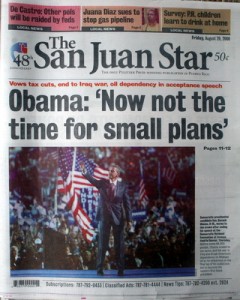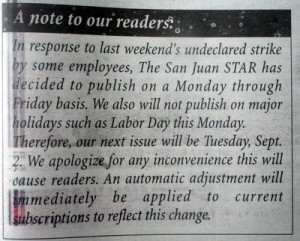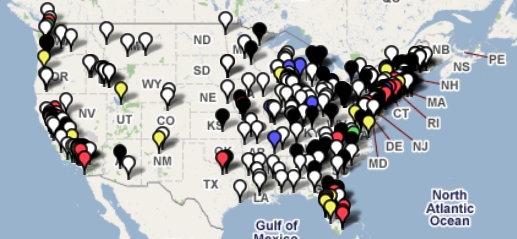 ‘When my students come back to visit, they carry the exhaustion of a person who’s been working for a decade, not a couple of years,’ says Duy Linh Tu of the Columbia University Graduate School of Journalism. ‘I worry about burnout.'”
‘When my students come back to visit, they carry the exhaustion of a person who’s been working for a decade, not a couple of years,’ says Duy Linh Tu of the Columbia University Graduate School of Journalism. ‘I worry about burnout.'”
He’s talking about the pressure of the new online newsroom. It used to be that daily deadlines were considered intense, but in today’s hyper-competitive environment, many reporters are expected to file several times a day. “Young journalists who once dreamed of trotting the globe in pursuit of a story are instead shackled to their computers,” writes The New York Times.
Some staffers at The Politico start their work days before dawn. Editors walk the aisles asking who’s broken a scoop that day, and reporters may wake up to find an e-mail sent at 5 a.m. asking why they were beaten on a story. The pressure is on to file something – anything – that a reader hasn’t seen before.
The Politico knows that the new competitive environment doesn’t tolerate delay. “Everybody in the audience is his or her own editor based on where they want to move their mouse or their finger on the iPad,” says Politico’s editor in chief, John F. Harris. Perhaps it’s not surprising that the Politico has lost about 20% of its news staff this year. But where are they gonna go? The website’s results-fueled journalism is becoming the norm.
The Christian Science Monitor sends a daily e-mail telling its reporters which stories had the highest view count the previous day. Gawker Media displays the top 10 most viewed stories, along with reporters’ bylines, on a monitor in its offices. Some news outlets even compensate their staff based on traffic. And then there are search-driven word factories like Associated Content and Demand Media that assign stories based upon search popularity and pay by the page view. Search marketing expert Mike Moran calls these outfits “content chop shops” that cheapen quality by elevating search visibility. But you can’t argue with success. Yahoo bought Associated Content for $90 million and Demand Media is reportedly hoping to be the first $1 billion IPO in nearly a decade.
The good news is that some media properties are hot again. The bad news is that they’re places where few people can apparently stand to work (See also Search-Driven News).
Miscellany
A.H. Belo reported a narrower second-quarter loss, but what stole the headlines on the earnings call was the rising importance of circulation revenue, which now accounts for nearly 30% of the company’s sales. In fact, circulation revenue was up 66% in the quarter, largely due to price increases at the Dallas Morning News. Executives crowed that the Dallas paper is now the third most-expensive in the country, behind only The New York Times and the Boston Globe. The prices are a function of “the quantity and quality of what we put in the newspaper,” said Belo CEO Robert Decherd. They’re also a function of what the dwindling ranks of elderly print readers are willing to pay. Belo also reported that it has $60 million in the bank and is increasing is earnings before interest, depreciation, taxes and amortization (EBITDA), even though revenues continue to decline. The company’s strategy appears to reflect that of many of its competitors: milk the print cow while you can, cut costs and hope to get traction in new markets. That’ll work for a little while longer.
The Democrat-controlled Federal Communications Commission surprised everyone this week by choosing to defend rules adopted under the George W. Bush administration that loosed restrictions on media cross-ownership. In a filing with the US Appeals Court, the FCC supported the 2007 ruling by a Republican-dominated FCC that made it easier for media companies to own multiple media outlets in the same marketing. The agency had been widely expected to take the first chance it had to reverse that decision in the name of restoring more competition to the market. FCC Chairman Julius Genachowski issued a statement that we read three or four times and still couldn’t understand. Perhaps the FCC has decided that owning multiple local media properties doesn’t matter for much when all are tanking at about the same speed. Fellow commissioner Michael Copps attacked the FCC’s decision and vowed to move the strengthening of cross-ownership rules “to the commission’s front burner where it deserves to be.”
And Finally
 Pulitzer-winning editorial cartoonist Steve Breen decided to satirize the Gulf oil spill by drawing some of his cartoons using oil instead of ink. The process turned out to be a lot more involved than you might think. Breen flew from San Diego to New Orleans on his own dime and then drove to Pensacola, FL to find tar balls of sufficient viscosity to work with. He then diluted the tar with various solvents until he hit upon gasoline as the perfect element to soften the tar enough to work with. The result is a striking sepia tone, with which Breen has skewered not only BP but also America’s obsession with oil. Here’s Breen’s page on the San Diego Union-Tribune site. Click on the image at right to see a gallery.
Pulitzer-winning editorial cartoonist Steve Breen decided to satirize the Gulf oil spill by drawing some of his cartoons using oil instead of ink. The process turned out to be a lot more involved than you might think. Breen flew from San Diego to New Orleans on his own dime and then drove to Pensacola, FL to find tar balls of sufficient viscosity to work with. He then diluted the tar with various solvents until he hit upon gasoline as the perfect element to soften the tar enough to work with. The result is a striking sepia tone, with which Breen has skewered not only BP but also America’s obsession with oil. Here’s Breen’s page on the San Diego Union-Tribune site. Click on the image at right to see a gallery.






 “Today is set aside as
“Today is set aside as  “Victimhood is an irresponsible abdication of responsibility, a surrender.”
“Victimhood is an irresponsible abdication of responsibility, a surrender.”





